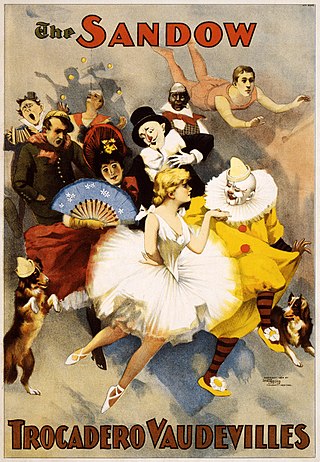
Vaudeville is a theatrical genre of variety entertainment which began in France at the end of the 19th century. A vaudeville was originally a comedy without psychological or moral intentions, based on a comical situation: a dramatic composition or light poetry, interspersed with songs or ballets. It became popular in the United States and Canada from the early 1880s until the early 1930s, while changing over time.

Robert Allen Cole Jr. was an American composer, actor, and playwright who produced and directed stage shows. In collaboration with Billy Johnson, he wrote and produced A Trip to Coontown (1898), the first musical entirely created and owned by black showmen. The popular song La Hoola Boola (1898) was a result of their collaboration. Cole later partnered with brothers J. Rosamond Johnson, a pianist and singer, and James Weldon Johnson, a pianist, guitarist and lawyer, creating more than 200 songs.

Theater in the United States is part of the old European theatrical tradition and has been heavily influenced by the British theater. The central hub of the American theater scene is Manhattan, with its divisions of Broadway, Off-Broadway, and Off-Off-Broadway. Many movie and television stars have gotten their big break working in New York productions. Outside New York, many cities have professional regional or resident theater companies that produce their own seasons, with some works being produced regionally with hopes of eventually moving to New York. U.S. theater also has an active community theater culture, which relies mainly on local volunteers who may not be actively pursuing a theatrical career.
Theatre Owners Booking Association, or T.O.B.A., was the vaudeville circuit for African American performers in the 1920s. The theaters mostly had white owners, though about a third of them had Black owners, including the recently restored Morton Theater in Athens, Georgia, originally operated by "Pinky" Monroe Morton, and Douglass Theatre in Macon, Georgia owned and operated by Charles Henry Douglass. Theater owners booked jazz and blues musicians and singers, comedians, and other performers, including the classically trained, such as operatic soprano Sissieretta Jones, known as "The Black Patti", for black audiences.

African-American musical theater includes late 19th and early 20th century musical theater productions by African Americans in New York City and Chicago. Actors from troupes such as the Lafayette Players also crossed over into film. The Pekin Theatre in Chicago was a popular and influential venue.
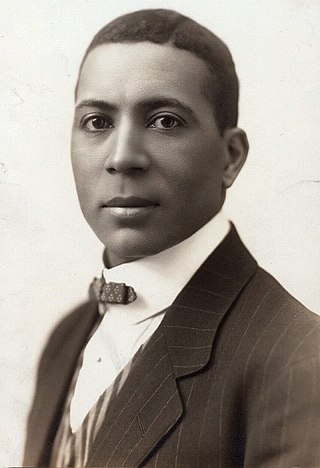
Sherman Houston Dudley was an African-American vaudeville performer and theatre entrepreneur. He gained notability in the late nineteenth and early twentieth century as an individual performer, a composer of ragtime songs, and as a member and later owner of various minstrel shows including the Smart Set Company. Dudley is also notable as one of the first African Americans to combine business with theater, by starting a black theater circuit, in which theaters were owned or operated by African Americans and provided entertainment by and for African Americans. He created the first black operated vaudeville circuit and led the way for what became the Theatre Owners Booking Association (T.O.B.A.).
Silas Green from New Orleans was an African-American owned and run variety tent show that, in various forms, toured the Southern States from about 1904 through 1957. Part-revue, part-musicomedy, part-minstrel show, the show told the adventures of short, "coal-black" Silas Green and tall, "tannish" Lilas Bean. There was never a Silas Green nor any notable connection to New Orleans. "Silas Green" was a fictional character created by the show's original writer, Salem Tutt Whitney.

Aubrey Lee Lyles, sometimes credited as A. L. Lyles, was an American vaudeville performer, playwright, songwriter, and lyricist. He appeared with Flournoy E. Miller as Miller and Lyles as a popular African-American comedy duo from 1905 until shortly before his death. in 1929 they appeared on film as grocers in the Vitaphone Varieties short comedy film They Know Their Groceries.

Aida Overton Walker, also billed as Ada Overton Walker and as "The Queen of the Cakewalk", was an American vaudeville performer, actress, singer, dancer, choreographer, and wife of vaudevillian George Walker. She appeared with her husband and his performing partner Bert Williams, and in groups such as Black Patti's Troubadours. She was also a solo dancer and choreographer for vaudeville shows such as Bob Cole, Joe Jordan, and J. Rosamond Johnson's The Red Moon (1908) and S. H. Dudley's His Honor the Barber (1911). Aida Overton Walker is also well known for her 1912 performance of the "Salome" dance at Hammerstein's Victoria Theatre. This was Aida's response to the national "Salomania" craze of 1907 that spread through the white vaudeville circuit.
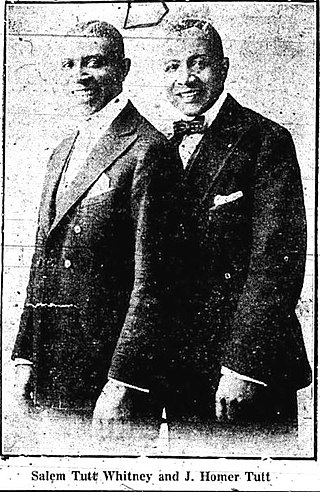
Salem Tutt Whitney and J. Homer Tutt, known collectively as the Tutt Brothers, were American vaudeville producers, writers, and performers of the late 19th and early 20th century. They were also known as Whitney & Tutt, Tutt & Whitney and the Whitney Brothers. They were prominent in black vaudeville and created over forty revues for black audiences.
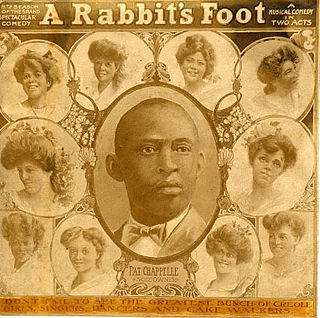
Black Vaudeville is a term that specifically describes Vaudeville-era African American entertainers and the milieus of dance, music, and theatrical performances they created. Spanning the years between the 1880s and early 1930s, these acts not only brought elements and influences unique to American black culture directly to African Americans but ultimately spread them beyond to both white American society and Europe.
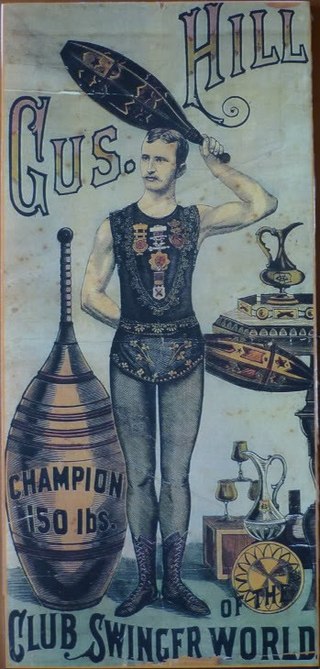
Gus Hill was an American vaudeville performer who juggled Indian clubs. He later became a burlesque and vaudeville entrepreneur. Hill was one of the founders of the Columbia Amusement Company, an association of burlesque shows and theaters, and became president of the American Burlesque Association. He also staged drama and musical comedies. He launched a highly popular series of "cartoon theatricals", musical comedies based on comic strips or cartoons. At one time he was running fourteen different shows.
Tom McIntosh was an African-American comedian who starred in many minstrel shows in the US from the 1870s to the 1900s. He was considered one of the funniest performers in this genre.

William C. McClain was an African-American acrobat, comedian and actor who starred in minstrel shows before World War I. He wrote, produced and directed several major stage and outdoor extravaganzas, and wrote a number of popular songs. He was influential in extending the range of minstrel shows far beyond the traditional conventions of the time, giving them appeal to much wider audiences. He toured in the United States, Canada, Australia and Europe. Later he promoted boxing and played several minor roles in movies.
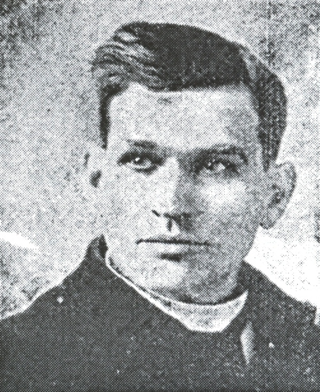
Sam T. Jack, a burlesque impresario, was a pioneer of the African-American vaudeville industry in the US with his Creole Burlesque Show. He was also known for staging increasingly risqué shows in Chicago, where young women appeared wearing only skin-colored tights.

John William Isham was an American vaudeville impresario who was known for his Octoroons and Oriental America shows. These had their roots in traditional minstrel shows but included chorus girls, sketches and operas. They were part of the transition to the American burlesque shows of the early 20th century.
Mabel Ridley was an American mezzo-soprano singer who appeared in Broadway theatre and revues in the 1920s and 1930s.
George Washington Bullion was a popular and long running three act musical comedy by the Tutt Brothers, Salem Tutt Whitney and J. Homer Tutt that debuted in 1910. Trevor L. Corwell, a white English impresario helped book the show. The storyline featured a black tobacco plantation owner aspiring to join high society. The Tutt brothers’ shows George Washington Bullion Abroad and How Newtown Prepared followed up on the characters in 1915 and 1916. Both shows had the characters of Washington and fellow veterans leaving to fight in foreign wars.
Andrew Tribble (1879–1935) was an African-American actor, comedian and female impersonator of the early 20th century who played a variety of women characters at Chicago's Pekin Theater, on Broadway and in touring companies throughout the United States. He is best known for his characters Lily White, a washerwoman, and Ophelia Snow, from Cole and Johnson's Red Moon production. He has been described as "a real genius" and "one of the greatest female impersonators".












